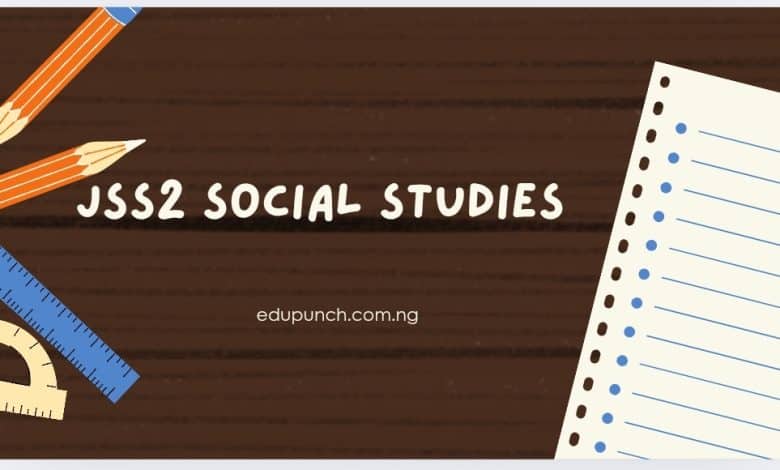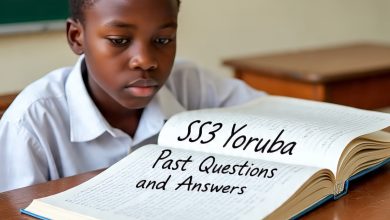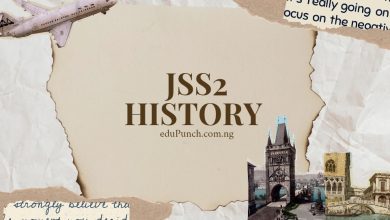JSS2 Social Studies Questions and Answers – First Term Exam

Prepare for your JSS2 Social Studies exam with our comprehensive questions and answers for the first term. Get ready to ace your test.
JSS2 Social Studies Questions and Answers
For teachers and tutors, these social studies questions will save you time typing and setting questions for your students.
The questions cover the first-term scheme of work. Contact Us to get complete questions and answers in PDF and document formats. You can edit them if you wish.
Read Also: JSS2 Social studies Exam questions -First Term
SUBJECT: SOCIAL STUDIES CLASS: JSS 2 TIME: 1 ½ Hrs
SECTION A
- Learning good behavioral pattern of individuals is an example of A. Direct learning. B. Social roles learning. C. Learning from models. D. incidental learning.
- The widest and modern socializing agent is A. School. B. Mosque or Church. C. Family. D. Mass Media.
- An accident is an unfortunate event that happens A. casually. B. favorably. C. unexpectedly. D. desirably.
- Marriage is most important to the society because it A. links up families in the community. B. ensures survival, continuity and stability of the society. C. makes couples close together. D. brings about disunity and disaffection in the community.
- Which of the following factors is not a condition necessary for marriage A. Religious similarities? B. Financial readiness. C. Psychological maturity. D. Social stability.
- A common feature in our marriage system all over Nigeria is A. number of husband or wife. B. fixed amount of money to pay. C. method and mode of ceremony. D. payment of pride price.
- Disagreement and lack of mutual understanding between a man and his wife can lead to A. Divorce. B. Courtship. C. Engagement. D. Prosperity.
- The following are social issues except A. Corruption. B. Prostitution. C. Obesity. D. Cultism.
- The following agencies were established to foster unity among Nigerians except A. Regional Politics. B. Unity Schools. C. National Youth Service Corps. D. Federal Character Commission.
- Consequences of conflict include the following except A. unstable economy. B. unity and progress. C. breakdown of law and order. C. lack of development.
- Marriage between a man and the widow of his late brother or father is called A. incest B. sororate C. levirate D. infant betrothal
- The first agent of socialization is the A. community. B. family. C. market. D. playmate. E. school.
- Drug abuse can be discouraged in the society through A. hawking. B. mass consumption. C. peer influence. D. public enlightenment. E. self-medication.
- Social Studies can be clearly defined as the study of A. how man produces what he wants. B. man and his family members. C. man and his environment. D. what man passes through in life.
- Which of the following is the basic goal of teaching Social Studies in our schools A. Prepare man for productivity. B. Create civic competency. C. Integrating ideas. D. Develop critical thinking man.
- Social organization has to do with A. only the family. B. raising and rearing of children. C. kinship relationship only. D. types of relationship and function of human organization.
- The family that is made up of father, mother, children and their relations is known as A. nuclear family. B. extended family. C. native family. D. close family.
- In what major way/s can a family survive the present economic hardship in the country? A. Engage in a small scale enterprise and be prudent in spending. B. Engage in farm work only. C. Being diligent at home and hardworking. D. Work for company and earn salaries.
- The total ways of life and living patterns of the people is defined as a. Religion. B. Social Studies. C. Culture. D. Social group.
- Cultural similarities can be clearly seen in the area of A. Language. B. mode of dressing. C. cultural festivals. D. music and dance.
- The two major aspects of culture are A. marital and non-marital. B. man-made and material. C. modern and non-modern. D. material and non-material.
- Which of the following is not a basic right of individual in Nigeria? A. freedom of movement. B. freedom of fight and quarrel with others. C. freedom of worship. D. freedom of expression and speech.
- A home can be said to be happy if there is A. health challenge. B. interference. C. poverty. D. tolerance. E. unfaithfulness.
- How many Local Government Areas are in Nigeria? A. 772. B. 773. C.774. D. 775. E. 776.
- The male child of one’s brother or sister is his/her A. aunt. B. cousin. C. nephew. D. niece. E. uncle.
- The process by which a child fits into the society is known as A. civilization. B. induction. C. initiation. D. orientation. D. socialization.
- In Islam, marriage is presided over by Imam, while in Christianity is by the A. Altar boy. B. Choir. C. Knight. D. Priest. E. Sexton.
- Which of the following statements is not true about the importance of social studies? It A. helps us to gain knowledge of our immediate environment. B. helps us to understand the importance of hard work and honesty in our society. C. helps us to understand the world around us. D. prepares the individual to live a dependent life. E. trains people to be effective leaders and good followers.
- Which of the following is a benefit of socialization? A. Creating crises in the society. B. Encouraging cultural differences among people. C. Encouraging laziness in the society. D. Promoting societal values. E. Tolerating juvenile delinquencies.
- A common feature in a traditional marriage ceremony is A. exchange of rings B. signing of a register. C. that it occurs in the bride’s home. D. that it takes place in the registry. E. the use of wedding gown.
- Which of the following is a feature of free and fair election? A. Ballot snatching. B. Multiple voting. C. Orderliness. D. Thuggery. E. Under- aged voting.
- Which of the following statements is true about extended family? It A. brings about healthy competition among family. B. discourages the building of a compound houses. C. pays attention and resources on the family alone. D. increases the number of dependents. E. limits the number of children per family.
- Social Studies as a subject integrate the following discipline except A. Economics. B. Geography. C. Government. D. History. E. Literature.
- ‘’Culture is dynamic’’ means culture is A. absorbing. B. changing. C. static. D. transferring. E. transmitting.
- ‘’The constitution is above every other laws in the country’’. This means that it is A. common. B. sectional. C. supreme. D. unique. E. universal.
- Which of the following statements is true about nuclear family? It A. consists of parents and children. B. increases the number of dependents. C. leads to the establishment of compound family. D. leads to joint education of family members. E. reduces the number of dependents.
- The total ways of life of a particular group of people is known as A. behavior. B. belief. C. culture. D. identity. E. practice.
- One of these is a concept of marriage except A. polygamy B. Endogamous practice C. Pressure practice D. Monogamy
- Which of the following is the duty of the Independent National Electoral Commission (INEC)? A. Conducting election. B. Conducting primaries. C. Issuing membership cards of political party. D. Organizing campaign and rallies. E. Selecting members of political parties for election.
- The line of descent through the mother’s side is called A. blood ties. B. conjugal. C. matrilineal. D. matrimonial. E. patrilineal.
JSS2 Social STUDIES Answers
SECTION B.
Answer any three questions in this section.
- Define marriage.
- State 5 procedures in marriage.
- What is adornment?
- State four forms of adornments commonly used in Nigeria.
- What is a drug abuse?
- List five causes of drug abuse
SECTION A
- C – Learning from models
- D – Mass Media
- C – unexpectedly
- B – ensures survival, continuity and stability of the society
- A – Religious similarities
- D – payment of bride price
- A – Divorce
- C – Obesity
- A – Regional Politics
- B – unity and progress
- C – levirate
- B – family
- D – public enlightenment
- C – man and his environment
- B – Create civic competency
- D – types of relationship and function of human organization
- B – extended family
- A – Engage in a small scale enterprise and be prudent in spending
- C – Culture
- D – music and dance
- D – material and non-material
- B – freedom of fight and quarrel with others
- D – tolerance
- C – 774
- C – nephew
- D – socialization
- D – Priest
- D – prepares the individual to live a dependent life
- D – Promoting societal values
- C – that it occurs in the bride’s home
- C – Orderliness
- D – increases the number of dependents
- E – Literature
- B – changing
- C – supreme
- A – consists of parents and children
- C – culture
- C – Pressure practice
- A – Conducting election
- C – matrilineal
SECTION B
Question 1: Marriage Definition: Marriage is a legally and socially recognized union between two people that establishes rights and obligations between them, their children, and their in-laws.
Five Marriage Procedures:
- Courtship and mutual consent between partners
- Introduction of families and approval from both sides
- Payment of bride price or dowry according to cultural traditions
- Performance of traditional marriage ceremonies
- Legal registration of the marriage with appropriate authorities
Question 2: Adornment Definition: Adornment refers to decorative items, accessories, or modifications used to beautify or enhance one’s physical appearance.
Four Forms of Adornments in Nigeria:
- Traditional jewelry such as beads, bangles, and necklaces
- Body art including henna designs and tribal marks
- Colorful traditional clothing and headwraps
- Hairstyles and hair accessories like cowrie shells
Question 3: Drug Abuse Definition: Drug abuse is the harmful or excessive use of legal or illegal substances that can lead to physical, mental, or social problems.
Five Causes of Drug Abuse:
- Peer pressure and influence from friends
- Curiosity and desire to experiment
- Family problems and lack of proper guidance
- Stress and depression from academic or social pressures
- Easy availability and accessibility of drugs
Don’t solely rely on these answers, research on your answers based on what you taught your students for more accurate marking guide.





One Comment